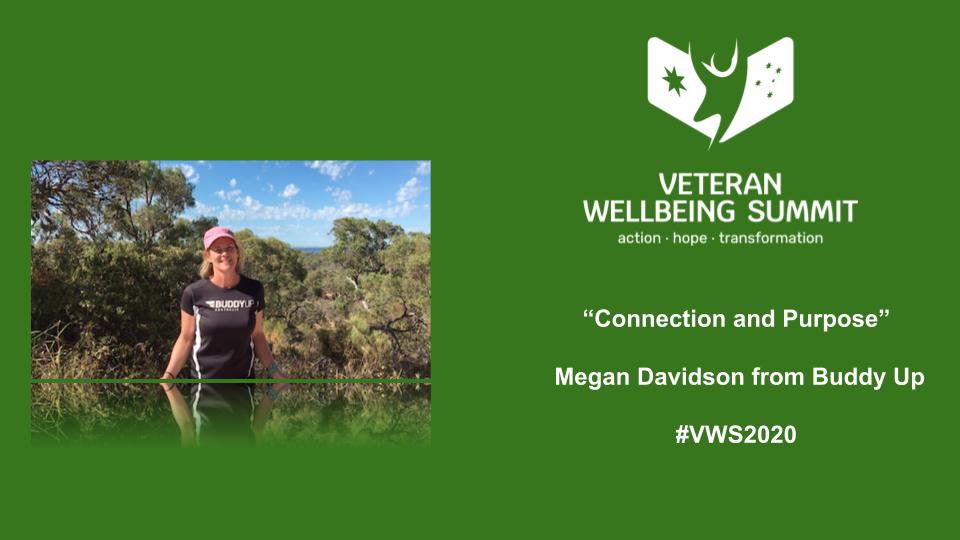Buddy Up Australia is modelled off a US organisation Team RWB using the research-based Connectedness model. This model demonstrates that people need both connection and purpose to have an enriched life. During service life these are achieved but there can be a loss of identity and connection after departing the services. This presentation will explain the Connectedness model, how we have been implementing it into Buddy Up Australia and how it can provide a positive alternative for veterans. There will be some anecdotal evidence of veterans who have been engaged to date. In particular, the ones who didn’t identify as having a loss of identity who have reported an increase in their mental health. This model forms part of a wider suite of support that veterans can tap into without specialised skills and that caters for their current stage of fitness, health and self confidence. Buddy Up Australia is an organisation focussed on action, having run over 250 events a year to support veterans. The presentation explains how our organisation focuses on events not meetings, on the now and the future rather than the past with the goal of personal transformation back into their local communities as a functioning human being.
Megan Davidson
Megan is the National Director of Buddy Up Australia. She has had significant experience in operational management having served as an officer in the Australian Regular Army for eleven years within the corps of Electrical and Mechanical Engineers (RAEME) and as a manager within a QLD Government Owned Corporation for eleven years. Concurrently, she has also led treks for Back Track Adventures along the Kokoda Track, the Inca Trail, up Mt Kilimanjaro in Tanzania and the high passes to Everest Base Camp in Nepal. She has a Masters in Adult and Vocational Education, a Bachelor of Business in Marketing and a Diploma of Management.
Q and A
- What is the difference or the benefit of the BuddyUp model vs other existing veteran network groups that focus on social connection and purpose? One difference is that BuddyUp does not exclude older veterans in their programs, and they also work to include emergency service workers, such as firefighters. They see a lot of military personnel who transitioned into emergency service worker positions, and emergency service workers also experience very similar challenges to their wellbeing.
- What could a qualified mental health peer worker, with a CERT IV in mental health, offer to the BuddyUp Australia program to help veterans? The model is based on a peer support system, which is why connectedness to others is so important. BuddyUp embraces people who have qualifications such as these, in order to use their skills to help others.
- Where did the name “BuddyUp” come from? Megan shared a personal story of telling people to “buddy up” in a time of distress in the military. This name stuck because it really exemplified the idea of inclusiveness and connectedness.
- Regarding the research done by Dr. Carolyn Angel, where is she based and is there going to ongoing research on the work that BuddyUp is doing? She is based in the northeast part of the U.S. (New York or New Jersey). At the moment, BuddyUp Australia is looking to use a version of her Enriched Life Scale to apply to their own organisation. Dr. Carolyn Angel is looking to see how this scale can apply even further globally, for her own research to prove the efficacy of the program.
- What does BuddyUp do as an organisation to train healthy peer support agents? At the moment, BuddyUp has the ability for peer supporters to tap into the Australian Counseling Association to provide supervision and support to chapter members. They are looking to get members skilled in mental health first aid and counseling.
- How was the organisation established and where does the funding come from for BuddyUp? The organisation was aimed to get compliance first, as the model was already successfully established. They first identified a board of directors to set it up as a company, and then organized charity and DGR status. In terms of compliance, qualifications have been met for all chapters. In terms of funding, the organisation receives membership fees (however, fees are established based on what individuals can afford), some government-funded grants, sponsorship, and fundraising. They also offer mental health first aid courses, to help train others and gain funding.
- Are activities tailored towards different age groups? Yes, and it also depends on the guidance of the chapter leader. Fitness activities are tailored towards the age group, what do members want, and what is the organisation capable of offering. BuddyUp Australia has about 200 members nationally.
You might be interested in
The Importance of Social Connection for Veterans
Veteran Sport Australia: The Power of Sport

